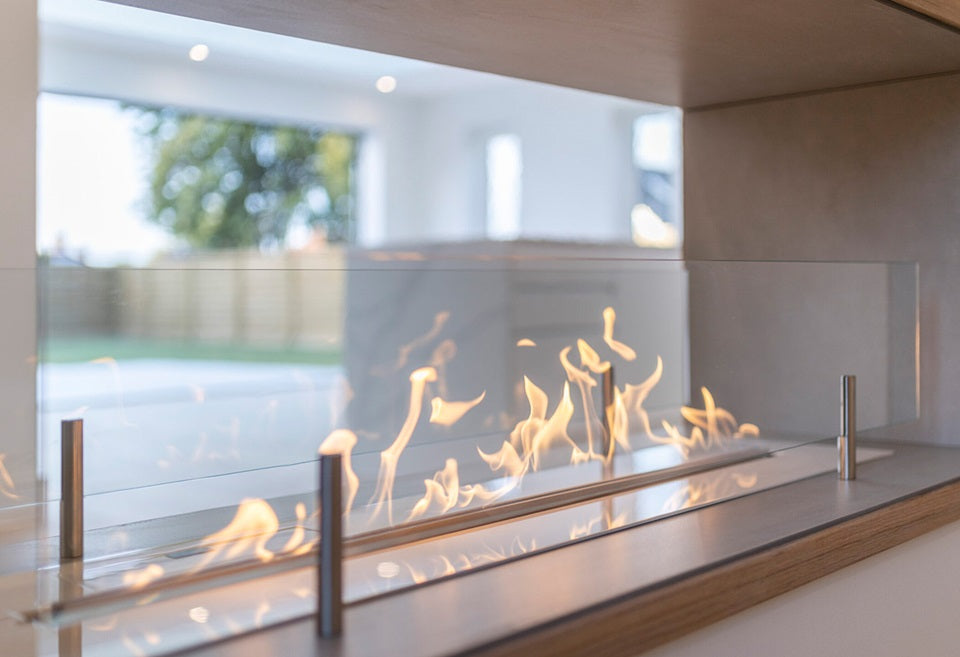It's critical to consider how heating solutions affect our wellbeing as worries about indoor air quality and health continue to grow. Traditional fireplaces are increasingly being replaced by bioethanol flames from BioFires, which burn cleanly and emit no toxins. We will answer the issue "Are bioethanol fires bad for your health?" and debunk fallacies about their safety in this article. Join us as we examine the effects bioethanol fires have on your health and highlight BioFires' dedication to your wellbeing.
Getting to Know Bioethanol Fires
Bioethanol fires are a sustainable heating option since they use renewable bioethanol fuel made from plant sources. The selection of bioethanol flames from BioFires blends modern styling with effective combustion to deliver a true flame experience without the use of a chimney or flue system. When evaluating the effects of bioethanol fires on health, it is critical to distinguish fact from fiction.
Addressing Health Concerns: Myth vs. Reality
- Emissions and Indoor Air Quality: It's a frequent misperception that bioethanol fires cause indoor air quality to be compromised by the emissions of dangerous compounds. However, bioethanol fuel is renowned for having a clean burn. It emits little toxic pollutants, such as smoke, soot, or particle matter, including very little carbon dioxide (CO2) and water vapour. Bioethanol flames do not represent a substantial harm to indoor air quality when used in a well-ventilated area.
- Concerns about Carbon Monoxide (CO) Contrary to conventional wood-burning stoves, bioethanol fires barely emit any carbon monoxide. The risk of exposure is decreased by appropriate fresh air intake and proper ventilation, which guarantee that any CO created is properly dissipated. To maintain a healthy indoor climate, it is essential to adhere to the manufacturer's recommendations for room size, ventilation, and fuel consumption.
- Odour and Irritants: During first ignition, bioethanol flames may release a faint aroma, however this quickly goes away as the flame stabilises. Any unwanted odours or irritants can be reduced with the use of high-quality bioethanol fuel and regular fireplace maintenance.
Security precautions and measures
- The room where the bioethanol fire is installed needs to have adequate ventilation in order to maintain the best indoor air quality and reduce any potential health hazards. This can be accomplished by opening windows, employing extractor fans, or adding more sources of fresh air. Maintaining oxygen levels and dissipating any pollutants require adequate air circulation.
- Fuel Handling and Storage: When using, storing, and replacing bioethanol fuel, it is important to use caution and adhere to the manufacturer's recommendations. To reduce the possibility of spills or mishaps, use special fuel containers and funnels. Keep the fuel adequately ventilated and away from heat sources like open flames.
- Regular maintenance and cleaning are essential for the bioethanol fireplace to operate safely and optimally. Clean the burner, check the fuel lines, and make sure the safety measures are operating properly by adhering to the manufacturer's instructions.
Extra Health Advantages
- Better Indoor Air Quality: Bioethanol fires' clean-burning characteristics reduce the emission of pollutants like smoke, soot, or allergies, which helps to enhance indoor air quality. For those who have allergies or respiratory sensitivities, this is very advantageous.
- Lessened Fire Hazards: Unlike conventional fireplaces, bioethanol fires don't require the use of wood or other combustible materials, greatly lowering the chance of unintentional fires and the accompanying health risks.
- Stress Reduction and Well-Being: A bioethanol fire can produce a calming atmosphere that encourages relaxation and stress reduction. The entire health and emotional well-being are positively impacted by a warm and cosy environment.
Making decisions about home heating solutions requires dispelling misconceptions about the effects of bioethanol burning on human health. Customers' wellbeing, indoor air quality, and safety are given first priority in BioFires' bioethanol fireplaces. Bioethanol fireplaces can be enjoyed safely without endangering your health if you follow recommended fuel handling procedures, ventilation procedures, and maintenance schedules. For a healthy, environmentally friendly, and sustainable heating option, pick BioFires' bioethanol fires.









